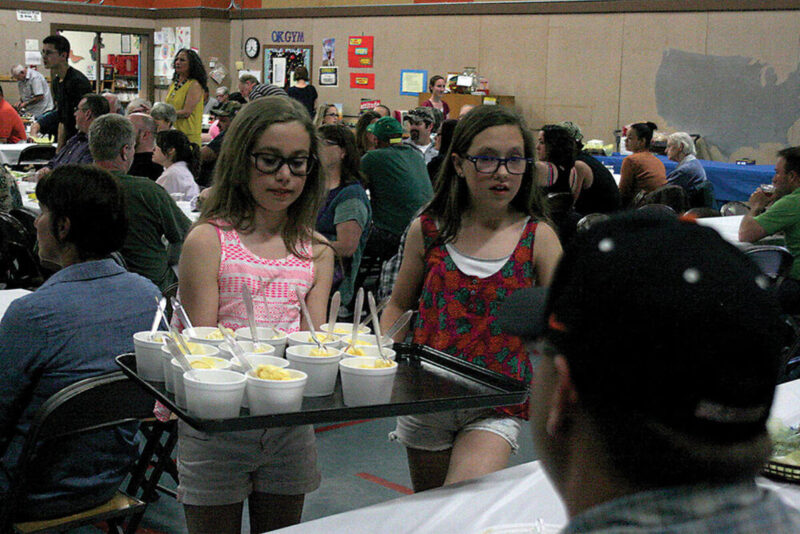Scott Swanson
After more than a year of COVID restrictions, including an eight-month shutdown, how is Little Promises Children’s Program doing?
It’s been difficult, said Erik Duncan, chairman of the board, a year of uncertainty.
Little Promises has been one of, if not the, primary provider of child care, especially for preschool children, in Sweet Home since its founding in 1982 by Anita Hutchins, who led the organization until 2013, when she turned it over to new Director Nelia Taraski.
There have been financial challenges, due to vastly decreased income from tuition – partly due to that shutdown, but the real challenge has been direction from the state, or lack thereof, he said.
Little Promises shut down “along with everybody else” in March of 2020, Duncan said, when the Oregon Department of Education closed schools across the state.
Then, to top that, the school’s well went bad, growing bacteria because of stagnation, which forced it to drill a new one.
ODE’s Early Learning Division officials last July issued new draft guidelines for child care centers, after a combination of new rules, COVID concerns, and related costs forced hundreds of care providers to close in the state, according to news reports.
Though preschools were allowed to re-open on July 1 of last year, the well problem and delays in getting a new one dug and tested set the school back until November, Duncan said.
“By the middle of November we were up and running, but we were pretty much closed for six months,” he said. “The consequen-ces of that is because people have to have daycare, we lost a portion of our clientele. People had to find places to put their kids.”
Duncan and Taraski said requirements for re-opening were “incredibly strict,” as Taraski put it last fall, speaking to a reporter.
The state’s 29 pages of guidance were divided into 14 sections, including revisions to drop-off and pick-up procedures, modifications for how to organize students into “stable groups,” and an expanded section on how to adequately clean and maintain buildings.
The draft included four entirely new guidance areas on family engagement, professional development, transportation and a “health and safety plan” section.
“We’ve been operating under COVID restrictions, which included class sizes,” Duncan said. Class sizes have been limited and one teacher has to stay with a specific group of children, which means teachers can’t be relieved while they’re taking breaks and kids can’t mix, such as on the playground.
“It’s been a very limiting factor,” he said. “We didn’t have the staff to man the rooms for 12 hours a day, so we’ve had to limit our hours.”
Little Promises had 22 staff members prior to COVID. It has about a dozen at the present.
Echoing what other educators have stated in recent months, Duncan said direction from Salem has been fuzzy, at best.
“Some restrictions have been lifted and we’re kind of feeling our way through that now,” he said. “The guidance hasn’t been really clear. Mandated restrictions are now strong recommendations, that’s open to interpretation.
“I’m anticipating, as we go forward, that we’ll get more and more clarity on how the restrictions are lifted and what we can do.”
He said the nonprofit school’s staff was expert at managing illness long before the arrival of COVID.
“I’ve always said, that anything 3 feet or under is simply a cesspool for disease,” Duncan said. “We operate under a different set of rules for disease control and other things, as a daycare. Our staff has done a really good job of keeping people safe.”
Little Promises’ enrollment is currently at about 50 percent of its maximum allowance of 120, he said.
Those are limited to pre-school and some kindergarten-aged children, he said. “”Eventually, we may get back to after-schoolers, but we can’t do that right now.”
“Long-term, I’d like to see operations come back to normal and run at the normal capacity without COVID restrictions,” he said.
Despite the costs of dealing with the well issues and the reduced tuition, which accounts for most of the school’s operating costs, it should be able to continue in the short term, he said. Little Promises received some government COVID grant money, which helped sustain it, he said.
Fundraisers, such as auctions and dinners, have helped raise money for other needs, such as the latest: upgrades of the toddlers playground area to make it safer. So have occasional grants from the Sweet Home Community Foundation and the city, among others.
Little Promises hasn’t gotten USDA money for lunch programs that were halted by COVID, he said.
“We’re at about half of what we brought in last year,” he said, adding that student numbers have increased “fairly steadily” since May.
“We’ve been able to maintain an operating cushion even though we are still not back up to our normal operating income,” he said. The school has been able to pay its rent to Sweet Home School District, which owns the former Pleasant Valley School building at the intersection of Pleasant Valley and Ridgeway roads, throughout the pandemic.
The goal is to “gain back clientele and return to normal operations,” Duncan said.
He said the school is not asking for help, but anyone interested in assisting should contact Taraski at (541) 367-4350.
“We’re not necessarily needing infusions. We have a buffer in the bank, but we appreciate the community supporting the fund-raisers we have run. We will probably continue to do those for specific needs.”
His biggest concern, Duncan said, is that state will re-impose restrictions.
“Some of this stuff may change next month, for better or for worse. It’s hard to predict.”





